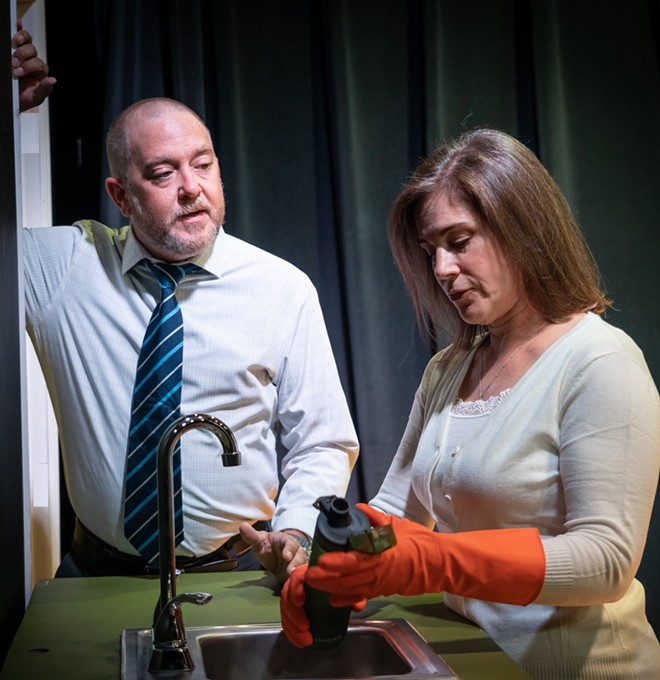
c/o Off-Central Players
(L-R) Alan Mohney Jr (Doug)and Debbie Yonas (Charlotte) in 'Something Clean' which runs through Aug. 28 at Off-Central Players in St. Petersburg, Florida.
They’re working their way through therapists like musical chairs.
The cast is immaculate. You sense the intimacy between Yones and Mohoney, a real life couple portraying parents of a white, college athlete serving time for a campus rape of a non-white woman. Charlotte needs an outlet to expiate her parental guilt, so she secretly volunteers at a sexual abuse crisis center run by Troy Brooks (Joey) who is the perfect comforting presence as the young, gay, Black abuse counselor who befriends her. But she’s loath to give her name lest she be linked to her son’s highly publicized case. Call me “Charlie.” But “do I have to have a name tag?” As they fill goodie bags with “strawberry condoms with vanilla lube” Charlie laughs with Joey that “nobody wants to make love to a milkshake.” Joey shares the shocking, shameful statistic that 60,000 children are assaulted every year. He prefers to call them, himself included, survivors rather than victims. What happens, Joey asks, when you’re “going to class with your predator three times a week?” Joey shares his experience of abuse at nine and despite a cheery sense of equilibrium that gives Charlotte hope, he offers that “there are still days when I’m not OK.”
Playwright Fillinger hints at societal issues that touch on the subject at hand, but essentially go unexplored. Why is alcohol abuse seemingly baked into the college experience, especially on fraternity row? Have we failed our sons (and therefore, ourselves) by neglecting to address an epidemic of anger, entitlement, and sexual violence? (Looking at you, Brett Kavanaugh). What about the racism inherent in a legal system where privileged white men (like son Kai) get a six-month slap on the wrist, while Joey reminds Charlie that a black man can count on decades. These questions are mentioned only in passing as the play focuses on the collateral damage within a family and a marriage.
How does a family deal with such a trauma? What combination of denial, guilt, and rage does it take to destroy a household, a marriage, or simply lead to a personal implosion? What hope do victims have when the focus is on whether the life of a “good boy” is ruined because he was a bit drunk and had “a few moments of poor judgment?”
Director Ward Smith has shown himself, particularly in Stageworks’ “American Son,” as a subtle actor and champion of “less is more.” In a intimate theater like Studio Grand Central he’s obviously coached restraint. We feel as though we’re a fly on the wall overhearing intimate conversations from everyday life in the kitchen, office, or in the bedroom. It’s all carefully calibrated for the space. Sadly, the parts of this puzzle gradually reveal a deep visceral trauma. Charlotte’s rubber gloves and her obsessive cleaning are merely the outward manifestation of her inner horror, much like Lady Macbeth’s “out, damned spot!”
One of the stars of the 85-minute intermission-less play is director Smith’s taut sound design. Its brief transitions and intermittent underscoring reinforce the emotional fragmentation that follows. Some of the splendid score echo’s the bass-slapping, mouth-popping we know from “Seinfeld,” other times it’s discordant, staccato woodwinds. It’s part of the essential engine that propels the episodic script forward as it provides hints of the emotional tenor of the scene to follow, from echoing, percussive pounding to a gentle saxophone over a few piano chords.
Charlie and Joey’s friendship grows until a surprising climax when unspoken truths collide.
And, although Fillinger has ostensibly set up the lightning-filled moments that lead to the rapid denouement, it’s a bit too convenient. The actors do a superb job, but the script lacks the gut punch that might arise from the preceding developments. Perhaps a Laura Linney or Mary-Louise Parker could conjure extra-textual pain for a cathartic moment as the subplots collide and unravel, but Ms. Yones is left hanging with a neat conclusion that leaves the audience without further insight about the important issues raised concerning parental guilt, racial injustice, and marital implosion under stress. Even so, it’s a worthwhile ride that raises far too many uncomfortable questions that our culture is still ill-equipped to address.

